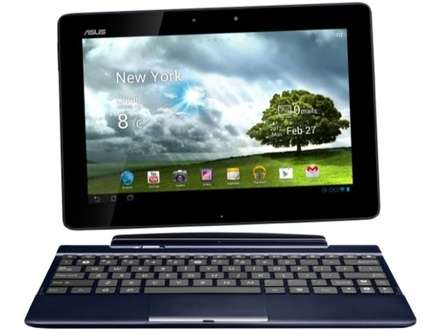Transformer Pad TF300 a weak replacement for laptop

Asus' new Transformer Pad TF300 is among the first of a new class of convertible devices that are heading toward store shelves.
Tablets are a hit with consumers, and there's a growing amount of software that allows them to perform tasks previously reserved for PCs. But certain tasks are still better suited for traditional computers, with their keyboards and precise pointing devices. You generally wouldn't want to type a long letter on a tablet's virtual keyboard, for example, or enter spreadsheet items using only your fingers.
That's where the new convertibles come in. Depending on users' needs, they can function as either laptops or tablets.
Some of these devices are traditional laptops that are outfitted with touch-sensitive screens mounted on special hinges that allow them to be rotated or folded to hide their keyboards.
Others, including the Transformer Pad, are iPad-like tablets that can be slid into hinged docks that include keyboards and track pads. When you're done using them, you can fold them up just like a typical laptop.
I've been testing out the Transformer Pad recently to get a feel for how the new convertibles might handle their dual roles. Toward that end, I wrote part of this column on it, using its keyboard dock.
Going in, I had my doubts about the concept. My test of the Transformer Pad didn't allay them. My take on the device is that it's a decent tablet, but a crummy laptop.
Part of the problem is the keyboard dock itself. It's small and cramped, and the experience of typing on it is much like using a netbook: uncomfortable. Thanks to the dock's small size, or possibly due to an oversensitive track pad, I also found while typing this column that my cursor repeatedly moved inadvertently to different lines of my document so that words and phrases would be placed in the wrong sentence.
Another problem is that the Android software the Transformer Pad runs was designed for touch-screen devices, not for keyboard-oriented ones. Yes, Android has supported the use of external keyboards and pointing devices for a while now. But much of what you'd want to do on the device is just easier to accomplish using its touch-sensitive screen.
For example, scrolling through a website using the arrow keys on the keyboard or the trackpad is a herky-jerky affair; it's much faster to just swipe the screen. Likewise, I found myself wanting to reach for the screen to do everything from open the applications folder to switching between apps; it seemed faster than trying to navigate to the appropriate icons using the small trackpad.
But it's awkward and uncomfortable to have to constantly reach forward to touch the screen.
Comfort aside, there are things that you do every day on a PC that you either can't do or have difficulty doing with Android. One big one is that you generally can't view multiple applications at one time in Android; instead, each one takes up the full screen when it's in the foreground.
That limitation can make office work - like writing a document, say - more difficult that it can be on a PC. Tasks such as copying and pasting text or images from one application to another or researching information in one program while writing in another are just easier to accomplish when the various programs are running in multiple visible windows. I ended up abandoning my effort to write this column on the Transformer Pad because it was just too uncomfortable and was taking too long.
The device is more satisfying as a simple tablet. It's got a bright screen that looks great, even if it's not as high-resolution as that of the new iPad. It's got an 8-megapixel rear-facing camera that takes pretty good pictures. It's one of the first tablets to run Google's Android 4.0, the latest version. And Asus has included with it some useful software, including an enhanced note-taking app that allows users to type, handwrite or dictate memos, and another app that allows users to upload and access files through a free cloud storage service.
What I liked best was its battery, which seemed to just keep going and going. I used the device off and on over the course of several days without having to charge it.
And, compared with the iPad, it's a bargain. The 16-gigabyte version of the Transformer Pad retails for about $380, or more than $100 less than the comparable iPad. However, the optional keyboard dock adds an additional $150 to its price.
That's not to say that it's a perfect tablet.
Despite having a supercharged quad-core processor, the device often feels sluggish. I found that it was sometimes slow to take pictures and load applications. But it was most noticeable when using the Transformer Pad's browser; Web pages frequently took inordinately long times to load.
Also, while there are now hundreds of thousands of Android apps, relatively few of them have been tweaked to work on tablets. So the apps often look stretched out or pixilated and their controls can be in hard-to-find places.
But if you're in the market for a tablet and you don't want the iPad, the Transformer Pad is a good one to consider. Just don't expect it to be a good substitute for your laptop.
---
ASUS TRANSFORMER PAD TF300
-Likes: Bright screen, high-resolution camera, latest version of Android, long-lasting battery, relatively low price
-Dislikes: Often sluggish, particularly with Web browsing; few apps available specifically for tablets; keyboard dock is cramped; interface not well-suited for use with keyboard
-Specs: 1.2GHz quad-core processor; 1.2-megapixel front and 8-megapixel rear cameras; 1280 x 800 pixel 10.1-inch screen; Android 4.0 Ice Cream Sandwich.
-Price: $380 for 16-gigabyte model, $400 for 32-gigabyte model; keyboard dock is an additional $150
-Web: asus.com
More information: Troy Wolverton is a technology columnist for the San Jose Mercury News.
(c)2012 the San Jose Mercury News (San Jose, Calif.)
Distributed by MCT Information Services




















